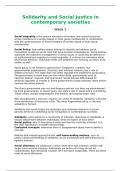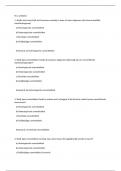Samenvatting
Summary ALLE Tentamenstof Solidarity and Social Justice in Contemporary Societies
- Instelling
- Universiteit Utrecht (UU)
Heb er zelf een 8 mee gehaald! Ietjes uitgebreider dan slechts aantekeningen van hoorcollege's. Het tentamen is vooral stampen, zorg dat je alle rijtjes goed kent. Lange teksten boeien wat minder.
[Meer zien]






